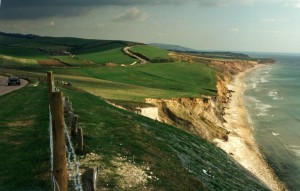Genocide on the Isle of Wight? July 13, 2010
Author: Beach Combing | in : Medieval , trackback
Beachcombing has noted before the refusal of archaeologists to face up to some of the bloodier customs of our ancestors. And what better example of this than the way that most archaeologists looking away on coming across any evidence of mass killings or human sacrifice in Dark Age Britain? Indeed, despite there being straightforward references in contemporary histories and in the archaeological record, archaeologists prefer to talk of ‘exaggerations’ or ‘misunderstandings’ and move on.
Take as an example Caedwalla’s conquest of the Isle of Wight. In c. 685 this king of the southern Anglo-Saxon kingdom of Wessex decided that he needed some Lebensraum. The result was that he called up his army and, well, Beachcombing will allow the early English historian Bede to tell the rest.
4, 16 After Caedwalla had possessed himself of the kingdom of the Gewissae [in the Thames Valley], he also took the Isle of Wight, which till then had been entirely given over to idolatry, and by cruel slaughter endeavoured to destroy all the inhabitants thereof, and to place in their stead people from his own province… Here I think it ought not to be omitted that the first fruits [in Christianity] of the natives of that island who, by believing, secured their salvation, were two royal youths, brothers to Atwald, king of the island, who were honoured by the particular grace of God. For when the enemy approached, they made their escape out of the island, and passed over into the neighbouring province of the Jutes; where, being conducted to the place called At the Stone as they thought to be concealed from the victorious king, they were betrayed and ordered to be killed. This being made known to a certain abbot and priest, whose name was Cynebert, who had a monastery not far from thence, at a place called Reodford, that is, the Ford of Reeds, he came to the king, who then lay privately in those parts, to be cured of the wounds which he had received whilst he was fighting on the Isle of Wight, and begged of him, that if the lads must inevitably be killed, he might be allowed first to instruct them in the mysteries of the faith. The king consented, and the bishop having taught them the word of truth, and cleansed their souls by baptism, made the entrance into the kingdom of heaven sure to them. Then the executioner being at hand, the princes joyfully underwent the temporal death, through which they did not doubt they were to pass to the life of the soul, which is everlasting.
How seriously should we take Bede here? Well, Bede, certainly, had access to sources from the south of England and Wessex, despite being based in distant Northumbria (Kirby). Then too this was relatively recent news. Bede was writing in 731 and had probably been born in c. 672, in other words this event was well within living memory – though Beachcombing has railed against that concept elsewhere. There is no reason then to assume that Bede was necessarily or even likely wrong about what he wrote.
The question narrows down now to how literally we should take Bede? Well, Bede’s Latin is clean and rarely if ever melodramatic – it certainly is not here. Of course, ‘[H]e also took the Isle of Wight… and by cruel slaughter endeavoured to destroy all the inhabitants thereof, and to place in their stead people from his own province…’ could be read or understood in different ways. Bede could have heard of a massacre and talked of all the Wighters being killed (or one of his sources might have). He could have been thinking – in a typical Dark Age Christian fashion – of the warrior class rather than the farmers, women and children. It is though to do violence to Bede’s prose to deny that a massacre took place. Yet most works that mention this passage remain in chronic and blissful denial before getting on with ‘the multicultural narrative’ of life in early medieval Britain.
What Beachcombing finds most interesting in the account is that Bede does not condemn (even by implication) the massacre – this was evidently a facet of Dark Age war (particulary against pagans?).
Also Beachcombing wonders whether Bede would have even mentioned this messy event if there had not been the ‘cute’ princes’ salvation story to tag on. In other words, not only did Dark Age massacres take place, but there is the risk that they may too be invisible to us, not having been reported by (our few) contemporary writers except in special circumstances.
Dark thoughts about the past…
drbeachcombingATyahooDOTcom For other views on Bede and genocide.



